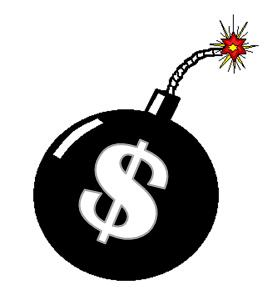By Printus LeBlanc
A recent report from the University of Illinois at Chicago named Chicago the most corrupt city in the U.S. with Illinois being the third most corrupt state. As expected, with corruption being the rule in Illinois, the state is a fiscal basket case. For decades corrupt politicians in the state made outlandish promises to the citizens and the public unions that run the state. Now the bill is coming due, the state cannot pay it, and the geniuses at the Chicago Federal Reserve have an idea that is only going to make matters worse.
The state of Illinois is so in debt it cannot possibly hope to get out. The public employee unions have run the state for decades and done nothing but continually increase the benefits of public unions. Knowing this was a problem for years, politicians refused to tackle the issue because they themselves were bought and paid for by the powerful public unions. According to one of the preeminent rating agencies, Moody’s, “Illinois owes over $250 billion in pension debt, far higher than the $130 billion the state says it owes.”
The state is in such bad shape, the state bonds are only one level above junk bond status. Of course, this means the state has to borrow money at a higher interest rate, costing taxpayers even more money. Gabe Petek, managing director of S&P Global Ratings, noted, “The investors are going to demand a higher yield on them and on the margins it increases the cost of the debt to the state and therefore ultimately the cost to the taxpayer that’s the source of funding for the state’s repayment.”
The rating gives the state the dubious distinction of earning the lowest credit rating on record for a U.S. state. When asked about the low rating, Moody’s stated, “The rating reflects Illinois’ extremely large net pension liabilities and a long history of unbalanced financial operations that culminated in a record level of overdue bills last year.”
To fix the unfunded pension problem, a trio of economists working at the Chicago branch of the Federal Reserve Bank unveiled a plan to conquer the problem. Was their solution to cut spending? No, was their solution to lower taxes and expand the tax base by attracting business investment? No, the brilliant solution from the highly educated economists was to raise taxes on homeowners, to raise property taxes on the people paying the second-highest property taxes in the nation is all they could come up with.
The plan was put on the Federal Reserve Bank of Chicago’s website earlier this month and has understandably drawn criticism. The plan calls for, “impose a statewide residential property tax that expires when its unfunded pension liability is paid off. In our baseline scenario, we estimate that the tax rate required to pay off the pension debt over 30 years would be about 1%.”
The cabal of economists gave several reasons why their plan is the best path forward, but the most insulting was their definition of “fairness.” The report states, “Fairness: Illinois residents who have benefited most from the past services of governmental employees are more likely to be homeowners, so it seems reasonable that they should pay a larger share of the costs.”
Anyone that owns a home knows this patently false. People that own their homes are less likely to be on government assistance, therefore not relying on state and local governments for healthcare, childcare, or transportation, and public sector unions run all of those industries. These are the same unions fueling the pension crisis.
The plan, if adopted, is an absolute train wreck. It will destroy the housing market. Home values will depreciate because of the tax, putting many homeowners underwater in their mortgage.
People are already leaving Illinois in droves. No state had more people move out of it than Illinois in 2017, causing the state to slip from 5th to 6th in state population rankings. Not only is this costing the state national political power in the House of Representatives, but it is also costing the state billions in tax revenue and economic activity.
Scott Moody of Illinois Policy stated, “due to the past 18 years of out-migration, Illinois has accumulated net losses of $47 billionin annual adjusted gross income and $8 billion in annual state and local tax revenue. Illinois’ financial situation will only improve when economic growth makes it easier for taxpayers to stay in Illinois.”
Whoever said, “if at first you don’t succeed, try try again” must have been a leftist politician. If excessive taxes drove people out of the state and shrank the tax base, how does it make sense to do the same thing again? Just like all cities should pay attention to Seattle and don’t emulate its job-killing regulations, all states should pay attention to Illinois. The state is a disaster and has provided the example for all other states not to follow.
Printus LeBlanc is a contributing editor at Americans for Limited Government.







